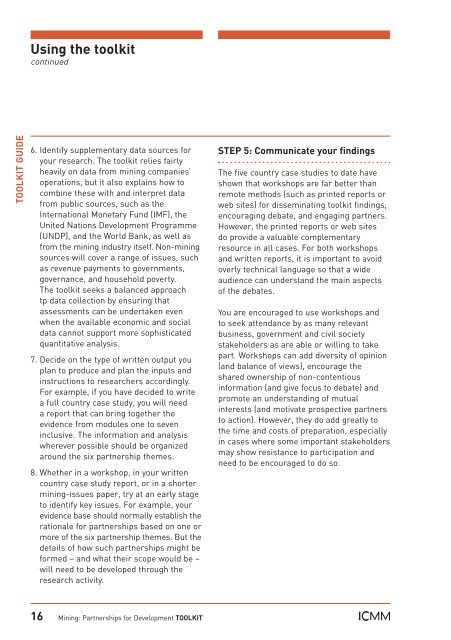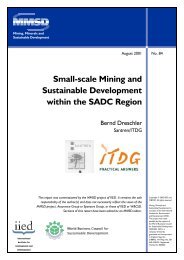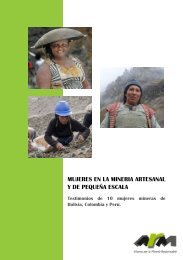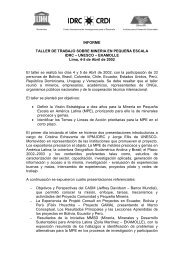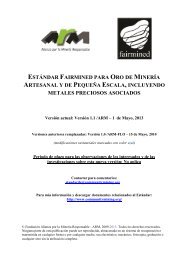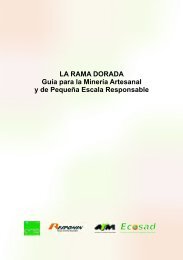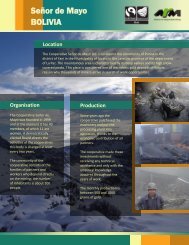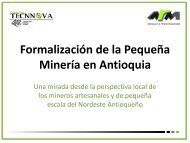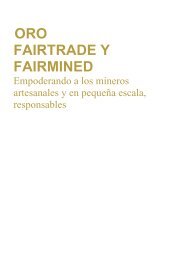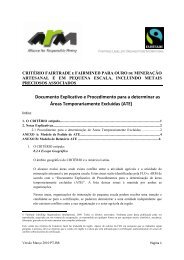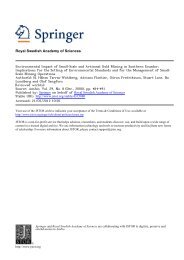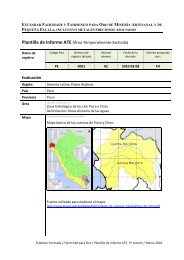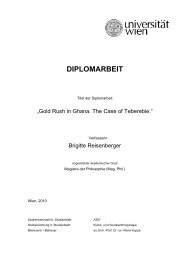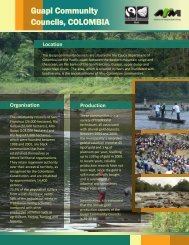Mining: Partnerships for Development Toolkit - Oxford Policy ...
Mining: Partnerships for Development Toolkit - Oxford Policy ...
Mining: Partnerships for Development Toolkit - Oxford Policy ...
Create successful ePaper yourself
Turn your PDF publications into a flip-book with our unique Google optimized e-Paper software.
Using the toolkitcontinuedTOOLKIT GUIDE6. Identify supplementary data sources <strong>for</strong>your research. The toolkit relies fairlyheavily on data from mining companies’operations, but it also explains how tocombine these with and interpret datafrom public sources, such as theInternational Monetary Fund (IMF), theUnited Nations <strong>Development</strong> Programme(UNDP), and the World Bank, as well asfrom the mining industry itself. Non-miningsources will cover a range of issues, suchas revenue payments to governments,governance, and household poverty.The toolkit seeks a balanced approachtp data collection by ensuring thatassessments can be undertaken evenwhen the available economic and socialdata cannot support more sophisticatedquantitative analysis.7. Decide on the type of written output youplan to produce and plan the inputs andinstructions to researchers accordingly.For example, if you have decided to writea full country case study, you will needa report that can bring together theevidence from modules one to seveninclusive. The in<strong>for</strong>mation and analysiswherever possible should be organizedaround the six partnership themes.8. Whether in a workshop, in your writtencountry case study report, or in a shortermining-issues paper, try at an early stageto identify key issues. For example, yourevidence base should normally establish therationale <strong>for</strong> partnerships based on one ormore of the six partnership themes. But thedetails of how such partnerships might be<strong>for</strong>med – and what their scope would be –will need to be developed through theresearch activity.STEP 5: Communicate your findingsThe five country case studies to date haveshown that workshops are far better thanremote methods (such as printed reports orweb sites) <strong>for</strong> disseminating toolkit findings,encouraging debate, and engaging partners.However, the printed reports or web sitesdo provide a valuable complementaryresource in all cases. For both workshopsand written reports, it is important to avoidoverly technical language so that a wideaudience can understand the main aspectsof the debates.You are encouraged to use workshops andto seek attendance by as many relevantbusiness, government and civil societystakeholders as are able or willing to takepart. Workshops can add diversity of opinion(and balance of views), encourage theshared ownership of non-contentiousin<strong>for</strong>mation (and give focus to debate) andpromote an understanding of mutualinterests (and motivate prospective partnersto action). However, they do add greatly tothe time and costs of preparation, especiallyin cases where some important stakeholdersmay show resistance to participation andneed to be encouraged to do so.16 <strong>Mining</strong>: <strong>Partnerships</strong> <strong>for</strong> <strong>Development</strong> TOOLKIT


